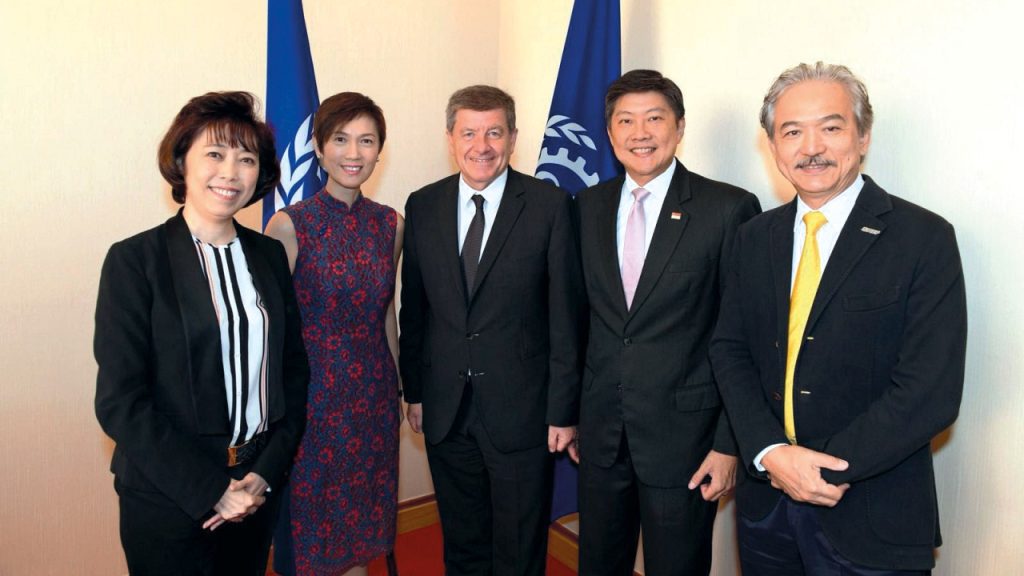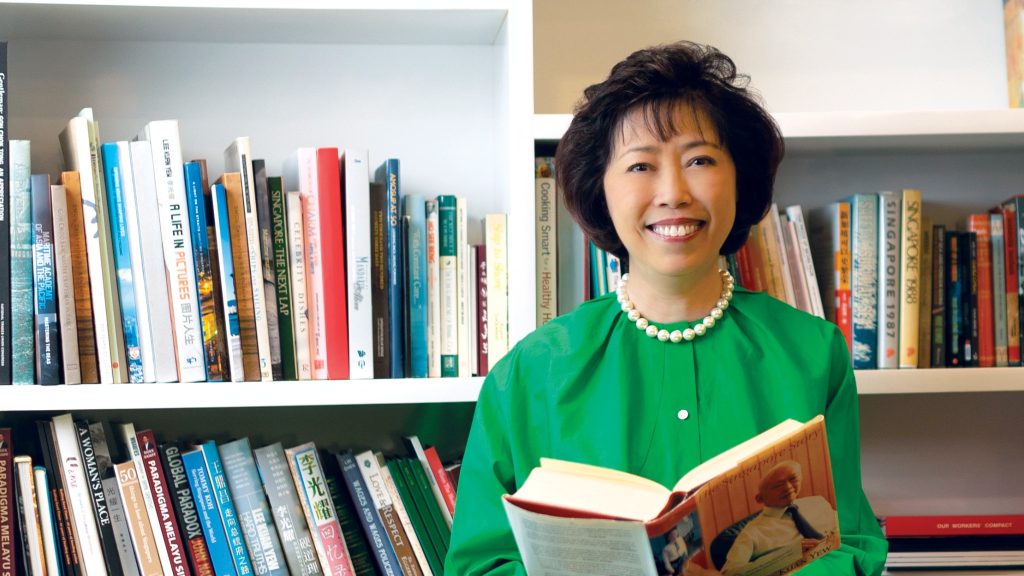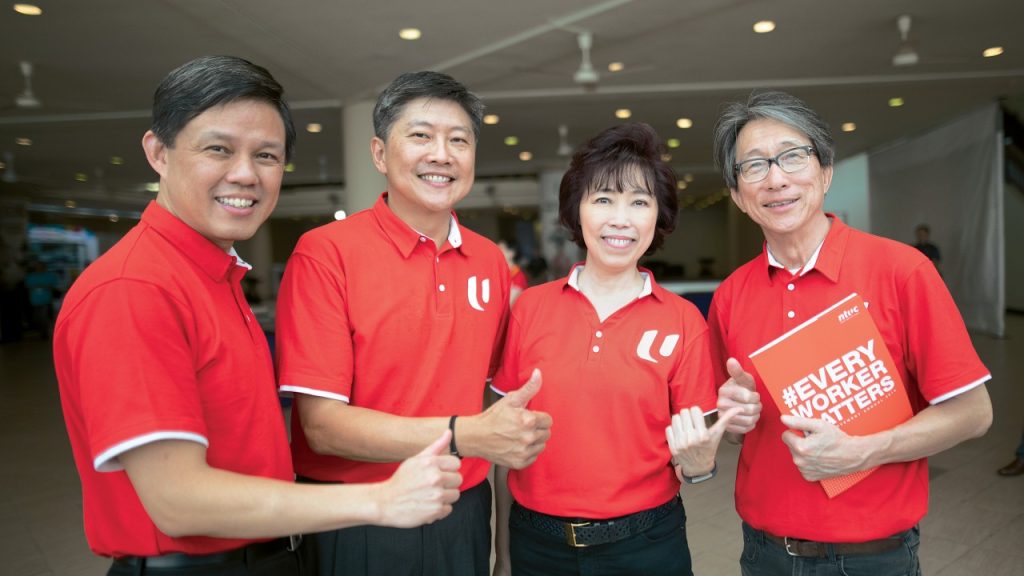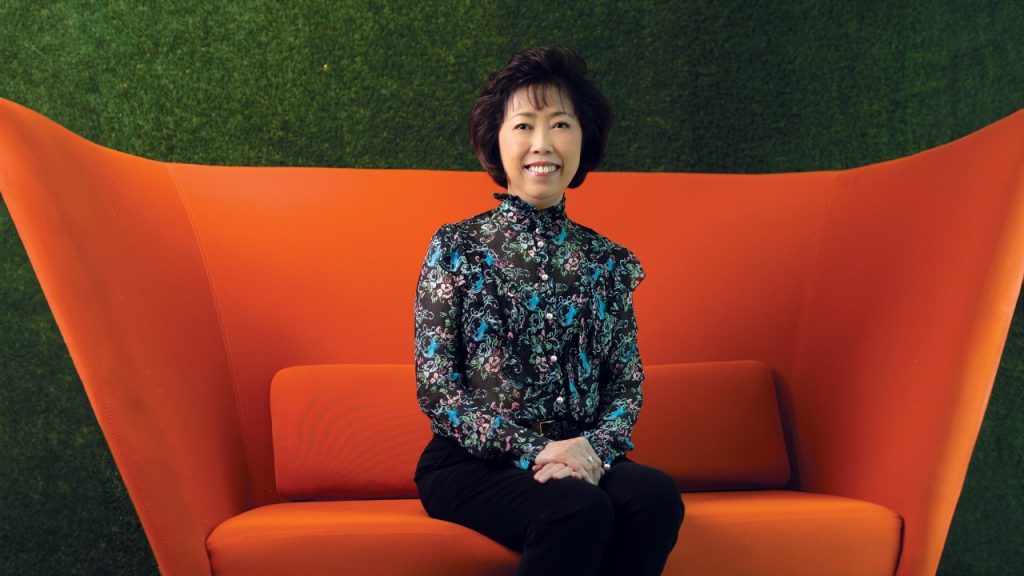This is a Q&A interview with NTUC Immediate Past President Mary Liew. Any extracts should be attributed to her. 10 May 2024.
NTUC has conferred the Distinguished Service (Star) to NTUC Immediate Past President Mary Liew at this year’s May Day Awards 2024.
Ms Liew was NTUC’s President from 2015 to 2023. She is currently still the General Secretary of the Singapore Maritime Officers’ Union (SMOU) and a Board Director of NTUC Enterprise Co-operative.
She shares with us her journey with the Labour Movement over the years, and her thoughts on how tripartite partners need to evolve to secure a place in the future global economy.
LabourBeat: How does receiving the highest honour for this year’s May Day feel?
Mary Liew: I feel deeply honoured to receive the highest honour for this year’s May Day. I was not expecting any award, and it is genuinely humbling to be recognised in this manner. This award is not for me but all who have made this incredible journey with me.
Without the unwavering support and trust of the Singapore Maritime Officers’ Union (SMOU) Executive Committee and its members, I wouldn’t have been able to assume the role of General Secretary, and the journey to NTUC would not have been possible. The dedication and solidarity of the SMOU Executive Committee and staff were pivotal in every step of the way, and I am deeply grateful for their steadfast support and encouragement.
I am also very thankful to God for blessing me with an amazing NTUC family, NTUC Central Committee, fellow union leaders, NTUC staff and Tripartite partners, including Brother Lim Swee Say, Sister Josephine Teo, Brother Tan See Leng and Brother Robert Yap, who have supported me and their commitment to Tripartism have been most encouraging. I am grateful for this opportunity to serve the Labour Movement.
Could you briefly share how you became a union leader?
My journey to becoming a union leader was unexpected yet deeply fulfilling. I first joined SMOU in the finance department but saw the needs of workers firsthand.
Notwithstanding the forgotten promises made during my job interview, on the increased wages upon confirmation after my probation, I decided to stay on. Witnessing poor union relations and members’ frustrations in the challenging labour climate of the 1980s, I was compelled to advocate for change, driven by a sense of mission to support staff and address seafarers’ needs.
Rising through the ranks wasn’t my initial goal; witnessing members’ struggles and the sacrifices of union leaders fueled my determination to serve. Particularly inspiring was then SMOU General Secretary Brother Thomas Tay’s sacrifice when he gave up his well-paying job to become a union leader with more than an 80 per cent wage cut, setting an example that deeply inspired me to live a purpose-driven life. Ultimately, my journey has been about making a difference and being a blessing in the lives of those around me.
What challenges did you face as a female unionist in the male-dominated maritime industry?
Some of the challenges I faced included breaking through traditional gender stereotypes, advocating for equal opportunities and representation, navigating predominantly male work environments, and addressing instances of discrimination or bias. Also, fostering trust and credibility among peers and stakeholders required extra effort due to gender biases. For me, it is important to have a mindset of meritocracy, where trust must be earned and it is not an entitlement.
During the COVID-19 pandemic, I worked closely with two amazing women – Sister Quah Ley Hoon, then Chief Executive of the Maritime and Port of Authority of Singapore (MPA), and Sister Caroline Yang, President of the Singapore Shipping Association. As female tripartite leaders, we led the maritime industry in having crew changes and crew vaccination, which advocated for our seafarers as essential workers who keep the global supply chain moving.
Overcoming these challenges strengthened my resolve to promote inclusivity and diversity within the industry, contributing to a more equitable and supportive workplace for all.

From when you first joined as a unionist in the 1980s till today, what are some of the most significant changes you have seen to the Labour Movement?
Since the 1980s, I’ve observed significant and positive shifts within the Labour Movement. SMOU, too, has transitioned from confrontation to collaboration, which has been marked by the union and partners taking proactive roles in addressing workplace issues and negotiating improved conditions. In the earlier years, SMOU was poor but hungry; we advocated for workers’ rights, which intensified. Embracing technology has revolutionised operations, enhancing communication, outreach, and adaptability.
Moreover, the Labour Movement has diversified across industries, reflecting evolving workforce dynamics. Collaboration among unions, employers, and government entities has strengthened, fostering innovative solutions to shared challenges. Lifelong learning initiatives have gained prominence, ensuring workers’ skill adaptability in a changing job market. These transformations underscore the Labour Movement’s ongoing evolution to effectively represent and serve workers amidst evolving economic and social landscapes.
How do you balance advocating for workers’ rights with maintaining good relationships with employers and industry stakeholders?
Tripartism is the key as we seek common ground through open communication and collaboration, fostering respect and understanding. Professional advocacy and a focus on evidence ensure effective representation without straining relationships. By building trust through reliability and considering long-term interests, we strive for sustainable solutions that benefit all parties involved.
How do you think NTUC needs to evolve to meet workers’ changing needs in the current economic landscape?
By embracing digitalisation to serve our workers better and equip workers with relevant skills. The Labour Movement must continue to take proactive steps to collaborate with companies on the Company Training Committee (CTC) to equip our workers better and to be future-ready. We also advocate for flexible work arrangements to address our workers’ changing needs and profiles. Strengthening social protection measures, including comprehensive healthcare and unemployment benefits, is crucial in today’s economic uncertainties. Prioritising lifelong learning initiatives fosters adaptability amidst technological advancements.
NTUC must continue championing inclusive economic policies and ensure better wages, welfare, work prospects, and equal opportunities for our workers. Additionally, I commend NTUC for the “EveryWorkerMatters Conversations” and for renewing the workers’ compact. This focuses on engaging with people on the ground, amplifying the voices and effectively addressing workers’ concerns.
Can you share a memorable experience or achievement as a union leader that has significantly impacted you?
One memorable experience as a union leader was navigating the challenges of COVID-19. The Labour Movement stays engaged and stands in solidarity with our tripartite partners to support our workers and families through this crisis of a lifetime. SMOU has successfully advocated for safe crew change protocols for seafarers, ensuring their safety amidst the pandemic. I was heartened that initiatives like the Singapore Shipping Tripartite Alliance Resilience (SG STAR) Fund went from a local to a global tripartite initiative bringing together like-minded international tripartite partners from the industry, unions and Government to facilitate safe crew changes.
Our vaccination outreach efforts further underscored our commitment to frontline worker safety. Another memorable experience was witnessing the unions in the Labour Movement come together to overcome the pandemic, exemplified by initiatives like the Care Pack Distribution. It was also gratifying to see people recognising and acknowledging seafarers as key players during the pandemic, emphasising their invaluable contributions to global supply chains. These experiences reaffirmed the importance of solidarity and resilience in safeguarding workers’ rights during crises.
How do you see the role of unions evolving in the future, particularly in light of technological advancements and globalisation?
As technology advances and the world becomes more interconnected, the role of unions is bound to change. We’ll focus more on ensuring that workers in the digital economy are treated fairly, advocating for their rights in the ever-evolving landscape of technology. Lifelong learning will also be a big part of what we do, ensuring workers have the skills to keep up with these changes.
We’re not just thinking locally anymore; we’re going global. It’s about working with other unions worldwide to tackle issues like outsourcing and holding big corporations accountable for their actions. And, of course, we’re all about diversity and inclusivity, making sure that every worker, no matter who they are, gets a fair deal.
Moreover, with the zero-emission goal, climate change is something we cannot avoid and is crucial for unions to navigate as the way we work is going to change. It’s not just us against them anymore. We’re working closely with businesses and governments to shape policies that work for everyone in this new world of work. We’re all in this together and can create a future where everyone has a fair shot.

How do you think the labour landscape in Singapore will change in the next decade, and what should workers and unions do to prepare for these changes?
Singapore’s labour landscape is set for substantial changes in the next decade, including increased automation, gig work expansion, and a focus on green jobs. To prepare, workers should prioritise continuous learning and upskilling, staying adaptable to evolving industry demands. Unions are pivotal in advocating fair treatment and benefits, particularly in non-traditional work arrangements like gig employment. Additionally, supporting initiatives for the creation of green jobs is essential. This entails promoting environmentally friendly employment opportunities and seeking relevant training. Collaboration between workers, unions, employers, and policymakers is vital to navigate these shifts effectively and seize emerging opportunities.
Moreover, we can look at NTUC’s active role in the CTC to upskill workers, ensuring they are part of the equation regarding changes in the labour landscape. This proactive approach underscores the importance of involving workers in decision-making processes and equipping them with the necessary skills to thrive in the evolving job market.

Looking back, is there anything you would have done differently in hindsight?
Reflecting on my journey as a union leader, I wouldn’t do anything differently in hindsight. Every experience, whether challenging or rewarding, has been precious and has contributed to my growth and learning. I am immensely grateful to everyone I’ve met throughout my journey, as they have rallied around me and provided unwavering support. From fellow union members and leaders to colleagues and stakeholders, their encouragement and collaboration have been invaluable.
Working with three great NTUC Secretaries-General (SG) during my term as a Central Committee (CC) member and then as NTUC President was an honour. When I joined the CC, Brother Lim Swee Say encouraged me as a Nominated Member of Parliament (NMP). Although for a short period, his guidance and mentorship inspired me to strive for excellence and to advocate passionately for the interests of workers. I am grateful for his support and the lessons I learned from him. I extend my heartfelt thanks to each of them for their dedication and commitment. I had the opportunity to work with Brother Chan Chun Sing, who encouraged me to step up as President of NTUC and allowed me to learn from him.
Additionally, I had the privilege of serving with Brother Ng Chee Meng, a bold, steadfast leader with a tremendous heart for workers in Singapore. I am blessed to have worked with him. As I continue to serve in various capacities, I deeply appreciate the ongoing support and encouragement from those with whom I have crossed paths.
What does the Labour Movement mean to you?
The Labour Movement represents a beacon of hope and support for workers, offering a platform to amplify their voices, address grievances, and effect positive change. The Labour Movement is here to serve our workers, ensuring that every worker matters and no one is left behind. Ultimately, the Labour Movement is a symbol of resilience and progress, dedicated to advancing the interests of workers and building a more just and equitable society for all.
What key factors contribute toa successful and harmonious labour-management relationship?
A successful and harmonious labour management relationship hinges on several crucial factors. Firstly, open and transparent communication fosters understanding and trust between both parties, facilitating the resolution of issues and the alignment of objectives. Mutual respect for each other’s perspectives, contributions, and rights is also paramount. Fair treatment and equitable policies further strengthen trust and satisfaction among workers. Cooperation towards common goals and effective conflict resolution mechanisms ensure that disputes are addressed promptly and fairly.
Finally, a commitment to engaging in collective bargaining in good faith promotes constructive negotiation and the development of mutually beneficial solutions. These elements collectively contribute to a positive and productive labour-management relationship, fostering a harmonious workplace environment.
As the former President of NTUC, what initiatives or programmes do you believe are essential to enhancing Singaporean workers’ overall well-being and job satisfaction?
I firmly believe that several initiatives and programmes are indispensable in enhancing Singaporean workers’ overall well-being and job satisfaction. Firstly, prioritising skills development and lifelong learning equips workers with the necessary competencies to thrive in an evolving job market. We are teaching them how to fish, empowering them for long-term success.
Secondly, supporting work-life balance through flexible arrangements and caregiver support programmes is essential, especially in an ageing population where we need to care for ourselves and our seniors. Workers are at the centre of everything, and their well-being is paramount. Reflecting on my time as an NMP, where we emphasised the importance of the “nest egg”, I was driven by the desire to ensure that workers can retire gracefully.
Additionally, uplifting the wages of our lower-wage workers is most important, and I spoke up for our bus captains. I was deeply touched when they expressed gratitude for my speaking up for them. Their improved wages and working conditions brought joy to my heart. Thirdly, implementing mental health and wellness programmes addresses workers’ holistic needs, managing stress and enhancing job satisfaction. Additionally, providing financial wellness education and ensuring workplace health and safety contribute significantly to workers’ well-being. Finally, establishing employee assistance programmes offers crucial support to employees facing personal or work-related challenges. These initiatives collectively foster a conducive work environment that promotes Singaporean workers’ well-being and job satisfaction.
As we move forward, it’s equally important to bring youth into the Labour Movement and nurture them, ensuring they are equipped with the skills and support necessary to thrive in the workforce of tomorrow.

As a recipient of the Top May Day Award for 2024, what message do you hope to convey to workers and employers in Singapore?
Let us cherish tripartism, never take our accomplishments for granted, and continue to build trust, championing the 3Ws for our workers to have better Wages, Welfare and Work Prospects; we want our workers to have safe working conditions and come home safely to their loved ones.
As a leader with decades of experience in the labour movement, what legacy do you hope to leave for future generations of unionists and workers in Singapore?
I am just an ordinary worker who believes in servant leadership, staying humble with a grateful heart, caring for people around us, and believing that every life matters. I aim to inspire future generations to dare to be different, challenge the status quo, and positively impact lives through their being, actions, and advocacy.

